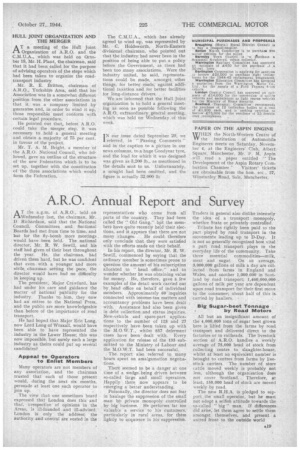A.R.O. Annual Report and Survey
Page 21

If you've noticed an error in this article please click here to report it so we can fix it.
AT the a g.m. of A.R.O., held on Wednesday last, the chairman, Mr. D Richardson, said that the National Council, Committees and Sectional Boards had met from time to time, and but for the fly-bomb more meetings would have been held. The national director, Mr. R. W. Sewill, and his staff had given of their best throughout the year. He, the chairman, had driven them hard, but he was confident that even with a younger and more virile chairman setting the pace, the director would have had no difficulty in keeping up.
The president, Major Crawfurd, has had under his care and guidance the matter of national publicity for the industry. Thanks to him, they now had an entree to the National Press, and the public are more knowledgeable than before of the importance of road transport.
He had hoped that Major Eric Long, now Lord Long of Wraxall, would have been able to have represented the industry in the Lower House; this was now impossible, but surely such a large industry as theirs could put up several candidates?
Appeal to Operators to Enlist Members Many operators are not members of any association, and the chairman trusted that each of those present would, during the next six months, persuade at least one such operator to join up.
The view that one sometimes beard expressed that London does this and that, irrespective of opinions in the Areas, is ill-founded and ill-advised. London is only the address; the authority and control are vested in the representatives who come from all parts of the country. They had been called the " Old Gang," but the members have quite recently held their elections, and it appears that there are not many changes. He could therefore only conclude that they were satisfied with the efforts made on their behalf.
In his report, the director, Mr. R. W. Sewill, commenced by saying that the ordinary member is sometimes prone to question the amount of his subscription allocated to " head office." and to wonder whether he was obtaining value for money. He, therefore, gave a few examples of the detail work carried out hy,head office on behalf of individual members. Approximately 60 inquiries connected with income-tax matters and accountancy problems have been dealt with. Assistance had also been given in debt collection and status inquiries. New-vehicle and spare-part applications to the number of 123 and 27 respectively have been taken up with the M.O.W.T., whilst 857 deferment cases have been dealt with. Every application for release of the 133 submitted to the Ministry of Labour and the M.O.W.T. had been successful.
The report a:so referred to many hours spent on amalgamation negotiations.
There seemed to be a danger at one time of a wedge.being driven between so-called large and small operators. Happily there now appears to be emerging a better understanding.
Personally, the director does not fear in haulage the suppression of the small man by private monopoly controlled by big business. He performs far too valuable a service to his customers. particularly in rural areas, for them lightly to acquiesce in his suppression. Traders in general also dislike intensely the idea of a transport monopoly, whether State or privately controlled.
Tribute has rightly been paid to the part played by road transport in the movements leading up to D-Day. It is not so generally recognized how vital a part road transport plays in the everyday life of the community. Take three essential commodities—milk, meat and sugar. On an average, 3,000,000 gallons of milk a day are collected from farms in England and Wales, and another 1,000.000 in Scotland by road transport; 1,460,000,000 . gallons of milk per year are dependent upon road transport for their first move to the consumer; about half of this is. carried by hauliers.
' Big Sugar-beet Tonnage by Road Motors All but an insignificant amount of the 4,000,000 tons of sugar beet grown here is liffed from the farms by road transport and delivered direct to the factories or to railheads. The livestock section of A.R.O. handles a weekly average of 75,000 head of stock from collecting centre to slaughter-house, whilst at least an equivalent number is brought to centres from farms by livestock carriers. The number of store cattle moved weekly is probably not less, although the organization does not cover Scotland. Therefore, at least, 150,000 head of stock are moved weekly by road.
The new R.H.A. is pledged to support the small operator, but he must not adopt a selfish attitude towards the so-called " big " man. If differences did arise, let them agree to settle them amongst themselves, and present a united front to the outside world




















































